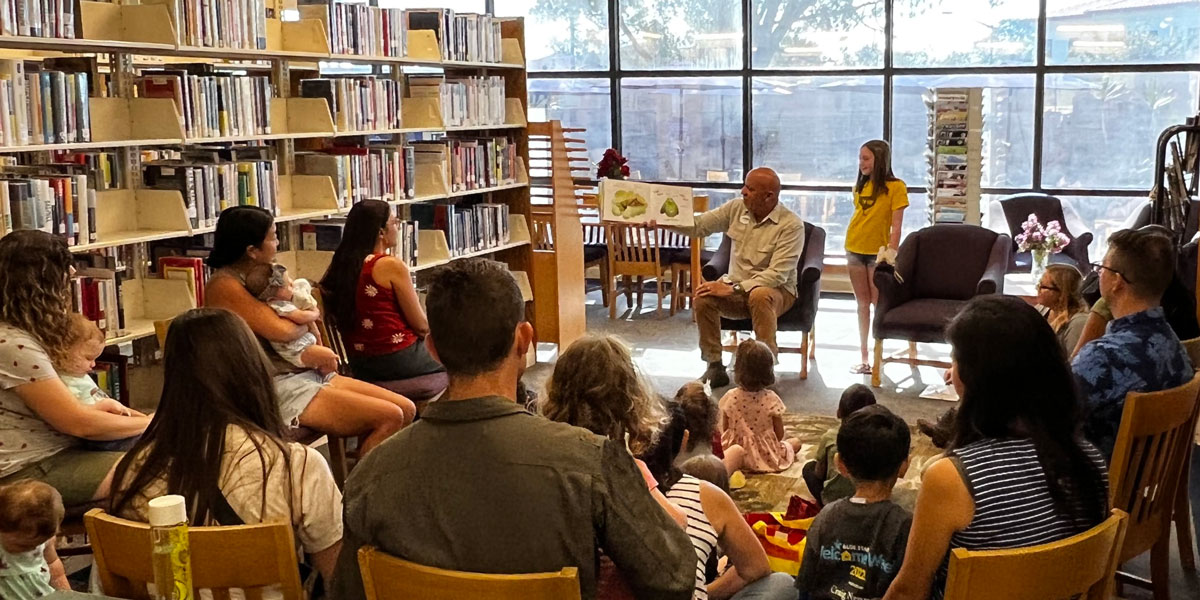Published: September 13, 2023

Written By:
Barry Trott, M.S.L.S., Library of Virginia
Leah Love, Blue Star Families
Military families move on average every two to three years, which means they are all-to-familiar with the sounds of packing tape, smells of cardboard boxes lining hallways, and watching in earnest as their entire lives roll away on a semitruck. As these families move — in fact, 600,000 military families make these moves each year — they land in their new community excited to make connections, hoping for neighbors who will welcome them. Making connections in a new community is vital to military families making smooth transitions. And while finding friends and supportive neighbors is key, having local community organizations and institutions who are ready to welcome them is just as important. With each new move come the same concerns — finding local services, meeting new neighbors, connecting with schools and other resources for kids, and most of all developing a sense of belonging to a welcoming and supportive community.
Libraries are particularly well-suited to welcome our military families. While many continue to host family favorite events like children’s story times, they have also evolved over the years to provide enhanced resources and opportunities such as outdoor exploring packs available for check-out or membership access for local attractions.
The Public Library Builds Connections
Public libraries are at the heart of their communities — a welcoming place for newcomers looking to connect with people, opportunities, and resources.
Libraries transform both individuals and communities and have amazing potential to support them. From introducing a new military family with young children to a social circle through story times and children’s programming, helping a teen find meaningful pathways to school success through library learning resources, or providing a military spouse the support they need to locate work in their new town, your public library builds community, sparks inspiration, and empowers new skills.
Additionally, librarians are skilled at making connections. It could be for a child trying to find just the right story to read, a student needing help with a school project, or someone looking to explore new directions in their life. In each case, and many others, the library supports and sustains its users. Through these actions, libraries develop relationships and build resilience in spaces that celebrate belonging and inclusivity.
Library Collections
When people think of libraries, the collections often come to mind first. While libraries still provide books, magazines, and DVDs, library collections have blossomed in the past decade with the addition of ebooks, audiobooks, and streaming videos that can be accessed when it’s convenient for you. Many public libraries now offer collections of games, puzzles, craft activities, and more for both kids and adults. Additionally, you can find collections of tools for the hobbyist or do-it-yourselfer. Many libraries also offer circulating technology such as Wi-Fi hotspots, so if you have not gotten a chance to get home internet set up, the library can help you bridge the gap.
Libraries also offer a wealth of online resources for learners of all ages. From students looking for research for school to genealogists to job seekers, a library card will connect you with what you need. The best part about these resources is you can access them from home, work, or wherever you happen to be. And online resources are available 24/7, so you can get to them on your schedule.
Many libraries offer military-specific resources such as VetNow, which offers an “all-in-one suite of services designed for a wide range of veteran needs whether it’s updating a resume for civilian life, navigating the VA system, or seeking local resources and support for veterans and their families.” With VetNow services you can get live help seven days a week from expert coaches and discover self-study tools to build skills and knowledge. In Virginia, VetNow is offered to all public libraries through the Library of Virginia’s state-wide database collection, Find It VA.
Getting Started
So how do you get started with these great collections, programs, and services? The first step is to locate your local public library. One place to start is the Find a Library tool from the National Center for Education Statistics. Here, you can browse by state and then by city or county to locate the library closest to you. In Virginia, the Library of Virginia’s Public Library Directory is the place to start, and most state library agencies have a similar directory of public libraries. Once you’ve found your library, the next step will be to get a library card. Most libraries will ask you to bring a photo ID and proof of local residence. A driver’s license can often satisfy both conditions, but you may want to check with the library before your visit to confirm what they require. A parent or guardian signature may be required to get children’s cards. And once you have your card, you’re set to place holds and check out library materials, access online content, and more.
A public library is a place for building community, feeling welcomed, and finding that sense of belonging we all seek when we move to a new location. With all it has to offer — space, programs, resources, and social connections — a relationship with your local public library opens up a world of possibilities and inspiration for your family and for military families serving across the country and around the world.
For more opportunities on exploring and getting connected in your community, join us for Blue Star Welcome Week from September 23rd — October 1st. We’ll have in-person and virtual events in communities across the country, plus giveaways through our digital neighborhood. And if you’re a business or organization looking to participate, reach out! We’d love to have you involved in welcoming our military families 365 days a year.
Posted In: Blue Star Welcome Week

